
NYC Media Lab at 2 Metrotech Center, Brooklyn
A unique effort to protect consumer privacy and support journalism is gathering steam after a Jan. 15 meeting hosted by the NYC Media Lab in Brooklyn. (WHO PARTICIPATED)
“We invited people we knew had the expertise, insight, and creativity to create a data ecosystem that protects consumers, supports quality journalism, and works for advertisers,” said meeting facilitator and privacy expert Michelle De Mooy.
Watch Michelle de Mooy’s event introduction. LAUNCH VIDEO
The Information Trust Exchange Governing Association (ITEGA), the Local Media Consortium (LMC) convened the multistakeholder meeting on trust, advertising and data privacy. Over two days, 40 publishers, marketing executives, privacy experts, academics and other stakeholders came together to define a new online ecosystem that will protect consumer privacy, improve brand safety, combat ad fraud and support journalism.
A key objective of the convening was developing a privacy statement to implemented by all of LMC’s 800 members. Discussants considered what kind of ad targeting is is ever acceptable to consumers, types of data individuals are comfortable sharing with news outlets and advertisers, and what the value exchange might be to support journalism.
Other meeting topics included current and pending data protection legislation, the economics and incentives behind ad fraud, the role of browser ad blockers in protecting consumers, and technology needed to support a more privacy focused digital news environment. The lack of accountability and transparency in today’s digital advertising ecosystem was seen as a critical issue to address. Participants discussed the elements of a governance framework and the necessity of a neutral third-party organization, such as ITEGA, to oversee it.
Task groups were formed to address privacy statement language, governance, technology, and user experience. Each task group will meet over the next couple of months and report on their progress on April 24 at a convening in Washington D.C.
What emerged was a consensus that such a new ecosystem is possible, and will depend on three pillars, governed by a nonprofit rule-making body:
- A privacy statement that can be consistently adopted across major publishers, that reflects the growing importance of user data consent, and that promotes the use of privacy protecting technology web-wide.
- Strong consent policies and technology prototyped and made available for adoption by major browsers, to promote an equitable privacy environment that gives a sustainable technical advantage to sites that inform users and facilitate data controls.
- A federated sign-on infrastructure that publishers can offer to their users as a benefit for those who choose to share identity and information, with permissioned and anonymized use for content and advertising personalization.
Stakeholders organized four committees, or task groups, to build these pillars:
- Privacy Committee, chaired by privacy and data consultant Michelle de Mooy;
- Browser Consent Committee, chaired by Mozilla’s Don Marti and EFF’s Andreas Arrieta;
- Publisher Tech Stack Committee, chaired by former IAB Tech Lab Senior Director Brendan Riordan-Butterworth;
- Governance Committee, chaired by ITEGA Executive Director Bill Densmore
The next multistakeholder convening will occur in April 2019 in Washington DC. Before the DC meeting ITEGA organizers expect a version of the consent tool will be tested on the Mozilla browser.
The DC meeting may include the following actions:
- Approve and announce a privacy statement approved by LMC publishers;
- Discuss and approve plans for a tech stack that will include a single sign on that individual publishers can implement and an opt-in user data exchange;
- Discuss rules and processes for the governing nonprofit.
RELATED LINKS:

